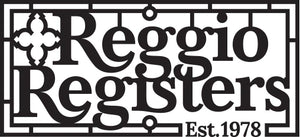Cast Aluminum vs. Cast Iron Registers
There are many things to consider when you’re ready to replace your HVAC registers, aka vent covers. Size, style, and color are all important, but have you considered materials?
Registers come in several materials: aluminum, cast iron, and steel. In a historic house, the look of cast iron registers is a must have. Staying true to that aesthetic is easy with Reggio Register’s Heritage Collection, Scroll style.
The Scroll style comes in two materials, cast aluminum and cast iron. Which is better? Which is right for your particular space? Here’s a little cast aluminum vs cast iron register analysis.
Weight
As you might have already figured out, cast iron is much heavier than cast aluminum. Cast iron, in most circumstances, just doesn’t work for wall vents. It’s too heavy.
On the other hand, the weight of cast iron can be beneficial too. Weighty cast iron registers for the floor don’t have to be secured to the floor in order to stay put.
Wet Conditions
In moist environments, like the bathroom, aluminum does a better job because it is rustproof. Cast iron can work in the bathroom too, but requires more maintenance to ensure it stays nice throughout its life.
Refurbishing
If you think you might decide further down the road to paint your registers, aluminum does a better job at that. The cast iron and its naturally darker color can be harder to get right when you paint.
Durability
All registers at Reggio Register (both cast aluminum and cast iron) are fully powder-coated. This makes them resistant to chipping, scratching, and general wear and tear.
Heating/Cooling Efficiency
Thinner, lighter aluminum heats up and cools down quickly so you don’t waste any warm or cool air on a register that’s at room temperature. It’s extremely efficient and very responsive to temperature so you end up lowering your energy costs.
Cast iron is heavier and thicker than aluminum and takes extra time to adjust. Once it’s up to temperature, it stays there longer and continues to influence the room temperature. This can also help you save on your energy bills.
Traffic
Floor vents can take a beating, especially if they are in high-traffic areas. Cast iron and cast aluminum are both very durable. They have the same thickness and strength. Their only difference is in weight.
Style
Victorian style registers bring a certain level of craftsmanship. In the past, this style of register was made entirely by hand. At Reggio, we maintain that sense of authenticity with hand-poured molds for our cast aluminum and cast iron products.
Both cast aluminum and cast iron registers are poured into precise and elegant patterns then are hand filed and washed and powder coated. We bring the best of technology and a heritage of the past together into one stand-out product.
A Word about Cast Iron
Not all cast iron is created equal. Reggio prides itself on creating some of the best registers on the market.
Our design is thicker and every style includes an underside lip to further enhance the fit of the register. Because of these things, our registers are about three times heavier than our competitors.
We also powder coat the entire register, not just the visible top side. This ensures that your registers will be protected from the elements on all sides. It also retains the color longer.
Read More about Cast Iron Registers
With all this cast aluminum vs cast iron register knowledge, we hope you’re able to decide on the best vent cover for your spaces. Next up, take a closer look at register styles.
Other Materials
If neither cast iron nor cast aluminum seem like a good fit for you, consider laser-cut steel or laser-cut aluminum. These offer more color options with excellent quality and Reggio’s excellent designs. Take a closer look to see your options.

